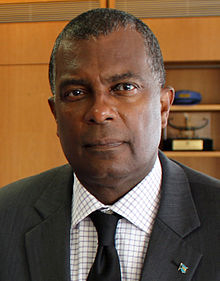Foreign Minister To Environment Meeting

The twenty-second session of the Conference of the Parties (COP 22) and the twelfth session of the Conference of the Parties serving as the meeting of the Parties to the Kyoto Protocol (CMP 12) will be held in Bab Ighli, Marrakech, Morocco from 7-18 November 2016. The Paris Agreement on Climate Change entered into force on 4 November 2016. As a result, the historic first session of the Conference of the Parties serving as the meeting of the Parties to the Paris Agreement (CMA 1) will also take place in Marrakech in conjunction with COP 22 and CMP 12.
Foreign Affairs and Immigration Minister, Fred Mitchell, will lead The Bahamas delegation participating in the meeting, where he will deliver a national statement on behalf of The Bahamas as well as meet with other high level personalities during the Conference. The delegation includes senior officials from the Ministry of Environment and Housing and The Bahamas UN Mission.
The Bahamas was one of the first countries to sign the Paris Agreement 22 April and subsequently deposited the instrument of ratification to the United Nations on 22 August 2016.
The COP 22 and CMA 1 take place at a time when small island developing states like The Bahamas are grappling with the dire consequences of increasingly dangerous hurricanes like Joaquim and Matthew, bringing to stark reality that much more needs to be done prepare for these major weather events. As pointed out recently by Prime Minister Christie, “Until we address with utmost seriousness and sincerity what is going on with our climate the increasing severity of these storms will have a devastating effect on island states. The fact is that we can no longer question whether climate change is valid our not. Weather events – hurricanes, droughts, floods, storms and other environmental threats –are increasing in frequency and intensity, and they have become the “new normal”. These events take a massive human toll and roll back years of development.”
New and adequate financial resource are needed to address climate change, and access to those resources are made available to middle income countries like the Bahamas. Furthermore, the unfair use of per capita GDP as a measure of economic growth, capacity and prosperity continues to disadvantage small countries like The Bahamas and prohibits them from accessing much needed development assistance or concessional loans.
Until these issues are addressed, the burden will continue to fall on small island developing states who are not primary contributors to global emissions and the negative impact of climate change
